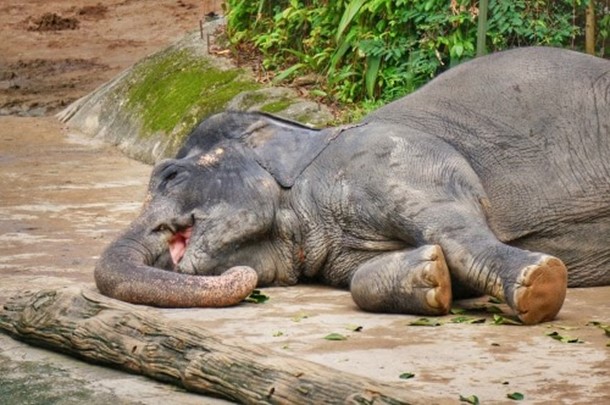Gabon Elephants To Go Extinct Due To Lack Of Fruits In The Forest

The elephant population in Gabon may eventually be reduced to zero if something is not done to ensure the availability of fruits on which the elephants feed in the forests.
According to a study carried out by Gabon and the University of Stirling in Scotland, United Kingdom, between 1986 and 2018, Gabonese forests registered a decline of 81 per cent in the production of fruits.
This has led to an 11 per cent drop in the physical conditions of the elephants in that country because they feed mostly on fruits.
This constitutes a serious threat to the population of the elephants found mostly in the Lope National Park.
The authors of the study, who include Dr. Emma Bush, Dr. Robin Whytock, Prof. Kate Abernethy and Prof. Lee White, said that “the long-time collapse in the availability of fruits is a serious threat to the mega-wildlife in the forests of Central Africa”.
The researchers put the blame for the rarity of fruits essentially on global warming, adding that the climate of the region has changed markedly since 1980 and is becoming hotter and hotter.
The research revealed that 40 years ago, at least one tree from 10 permitted the elephants to be furnished with their fruit rations.
However, the elephants have to visit more than 50 trees in the hope of finding ripe fruits, a situation which negatively affects their physical conditions.
“The massive collapse of fruit-bearing within more than seventy species of trees studied in the Lope National Park of Gabon, can be attributed to the increase in temperatures and the reduction in rainfall.
“Less fruits in the ecosystem signifies the weak dispersion of grains, difficulty in the reproduction of plants and the non-availability of food for the elephants, the chimpanzees and the gorillas”, revealed Dr. Emma Bush.
The study also revealed that between 1986 and 2018, the temperature has increased by about one degree centigrade, whereas certain tree species in the Lope National Park depend on a drop in temperature in order to flower and produce fruits.
Support Our Journalism
There are millions of ordinary people affected by conflict in Africa whose stories are missing in the mainstream media. HumAngle is determined to tell those challenging and under-reported stories, hoping that the people impacted by these conflicts will find the safety and security they deserve.
To ensure that we continue to provide public service coverage, we have a small favour to ask you. We want you to be part of our journalistic endeavour by contributing a token to us.
Your donation will further promote a robust, free, and independent media.
Donate HereStay Closer To The Stories That Matter




